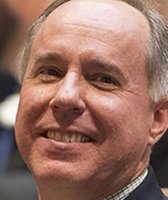Stand up for the facts!
Our only agenda is to publish the truth so you can be an informed participant in democracy.
We need your help.
I would like to contribute

Sen. Marco Rubio, a member of the Senate Select Committee on Intelligence, was very critical of Snowden for not following the law. (AP file photo)
Florida Sen. Marco Rubio makes it clear where he stands on Edward Snowden’s exposure of the National Security Agency’s spying programs: The situation couldn’t be more dire.
"The single most damaging revelation of American secrets in our history," Rubio said when asked about the matter after a foreign policy speech at the University of Texas on April 15.
"I can say to you unequivocally that there are Americans whose lives are at risk because of those disclosures," Rubio said, adding, "It’s been this massive revelation of all sorts of information about the way we operate to keep Americans safe delivered to potential adversaries, both the Russians and potentially the Chinese, done in the most damaging way possible and sprinkled with a bunch of lies."
There’s little question that the revelations are nearly unprecedented in the history of American espionage.
Snowden, a former CIA employee, gave a small group of reporters thousands of classified documents he found with his security clearance as a contractor for the NSA. The information detailed surveillance programs and data mining operations against world leaders and American and European citizens. Facing espionage charges, he is now living in an undisclosed location in Russia.
Sign up for PolitiFact texts
Rubio’s comments did make us wonder whether there were other instances of espionage that would qualify as more wide-reaching than Snowden’s case. (Rubio’s office pointed us to an article in The Hill that argued Snowden’s actions no doubt helped terrorists.) We can’t fact-check Rubio’s opinion on the situation, but we did survey a raft of historians and experts to see if they felt the senator was making a reasonable point.
The verdict: Reasonable, perhaps, but not definitive.
The many experts we spoke with had different opinions on the matter, and a lot depends on how you define "damaging."
The most serious instances come down to someone being killed, whether they be soldiers, covert agents or informants, said Daveed Gartenstein-Ross, a senior fellow at the Foundation for Defense of Democracies. Long-term revelations that compromise U.S. operations also can cause major damage, he said.
He compared the Snowden case with the Pentagon Papers, in which former government military analyst Daniel Ellsberg released a classified history of U.S. involvement in Indochina from World War II to 1968. The report, which the New York Times published details of in 1971, revealed the United States had secretly escalated the Vietnam War without the public’s knowledge. Ellsberg was charged with espionage, but the case was later dropped. The entire 47-volume report was declassified in 2011.
That’s a different type of revelation, though, than spies who decided to go work for the other side. Bruce Thompson, a lecturer on history and literature at the University of California-Santa Cruz, pointed to several of what he termed "major spy-traitors of the second half of the 20th century" as revealing secrets that were more damaging than Snowden’s.
Thompson pointed to Aldrich Ames, a double agent in the CIA who exposed virtually all Soviet agents of the CIA and other American and foreign services he knew of between 1985 and 1994, leading to some of those people’s deaths.
Also on Thompson’s list are John Walker, who ran a spy ring selling secrets to the Soviet Union for almost 20 years beginning in the 1960s; and Ronald Pelton, an NSA analyst convicted in 1986 for selling secrets to the Soviets to pay gambling debts.
There was also Robert Hanssen, an FBI analyst who sold secrets about espionage, communications, FBI moles and more to Soviet and later Russian officials between 1979 and 2001. Hanssen’s case led to the production of the 2007 film Breach, which carried the tagline, "Inspired by the true story of the greatest security breach in U.S. history."
In a similar vein, the case of Julius and Ethel Rosenberg centered on a major secret being relayed to the Soviets. Ethel’s brother, David Greenglass, worked on the Manhattan Project and was persuaded by his sister in 1944 and 1945 to provide details about the atomic bomb to her and her husband Julius, an electrical engineer discharged from the Army signal corps for being a member of the Communist Party.
In 1950 they were charged with conspiring to sell the information to the Soviets and found guilty the following year, after a controversial trial filled with circumstantial evidence. They were executed in 1953.
But those examples perhaps aren’t the best comparison for Rubio’s statement, Thompson said.
"It's not implausible that Sen. Rubio is right about this," he said. "One difference between Snowden and previous episodes of treason seems to be the sheer abundance of the highly secret material he was able to steal and divulge in a relatively short period of time."
These cases all involve people selling secrets to other countries, however, and not releasing information to journalists in an attempt to expose perceived wrongdoing, which is what Snowden has claimed. In that respect, the Chelsea (formerly Bradley) Manning Wikileaks saga may be a better comparison.
Manning was convicted last year of stealing some 750,000 classified documents and videos pertaining the Iraq and Afghanistan wars and disseminating via the online portal Wikileaks. Manning’s goal was to expose possible abuses by U.S. forces in those conflicts and had tried contacting traditional news outlets first, not selling them for personal gain.
Manning, who now identifies as transgender, is serving 35 years in a military prison.
Ted Bromund, a senior research fellow at the Heritage Foundation, said the Manning leak was likely less damaging than Snowden’s revelations because the information Manning stole will eventually be largely declassified in time.
"That cannot be said of the NSA leaks," he said. "So while this is not the sort of matter that can be proven definitively, Sen. Rubio's position is sensible."
Not everyone we contacted agreed. Kristie Macrakis, a history professor at Georgia Tech, called Rubio’s declaration "rhetoric that needs more substantiation."
She compared the Snowden situation to the findings of the Church Committee, a Senate investigative committee from 1975-76. The committee exposed U.S. assassination attempts of foreign leaders (including Fidel Castro) and made public news that the CIA and FBI opened and photographed private mail from the 1950s to 1973.
"This (revelation) was damaging to the U.S., but it got the intelligence community back in line and prevented further abuse," Macrakis said.
Cameron University history professor Lance Janda says we can’t judge Rubio’s rhetoric based on the facts in the public record.
"Rubio’s statement is difficult to verify or repudiate because we don’t know exactly what information Snowden has shared with the Russians or anyone else, and we don’t know the full extent to which he compromised future operations or practices that might have gained us valuable information," Janda said. "The verdict is still out on Snowden. We may find out in the future that his actions were even more damaging than we realize at this point."
But at least one scholar suggested the Snowden affair may actually be helpful in the long run, by showing that citizens are willing to speak up if they believe the government is doing something wrong.
"The Snowden revelations enhanced the reputation of the United States," said Rhodri Jeffreys-Jones, University of Edinburgh professor emeritus and author of In Spies We Trust: The Story of Western Intelligence. "It showed your nation is committed to the exposure of wrongdoing, and that this culture has permeated the outlook of individuals who are prepared to be whistle blowers."
Our Sources
Austin American-Statesman, "Marco Rubio: Edward Snowden’s leaks the most damaging in U.S. history," April 15, 2014
The Hill, "Intel panel: DOD report finds Snowden leaks helped terrorists," Jan. 9, 2014
CNN, "WikiLeaks source Manning gets 35 years, will seek pardon," Aug. 22, 2013
Robert Thompson lecture notes, provided April 17, 2014
Interview with Lance Janda, Cameron University history professor, April 17, 2014
Interview with Kristie Macrakis, Georgia Tech professor, April 17, 2014
Interview with Bruce A Thompson, UC Santa Cruz continuing lecturer, April 17, 2014
Interview with Rhodri Jeffreys-Jones, emeritus professor at the University of Edinburgh, April 17, 2014
Interview with Andrew Bacevich, Boston University international relations professor, April 17, 2014
Interview with Ted Bromund, senior research fellow at the Heritage Foundation, April 17, 2014
Interview with Daveed Gartenstein-Ross, senior fellow at the Foundation for Defense of Democracies, April 17, 2014
Interview with John Pike, director of GlobalSecurity.org, April 17, 2014
Interview with Alex Conant, Marco Rubio spokesman, April 17, 2014




























